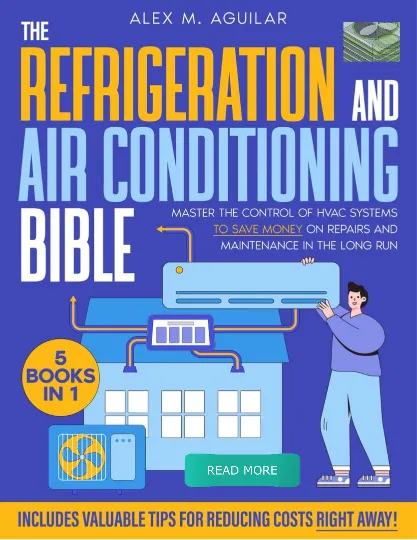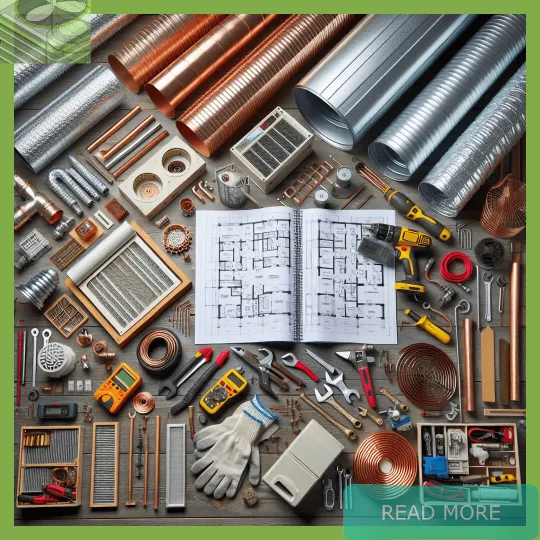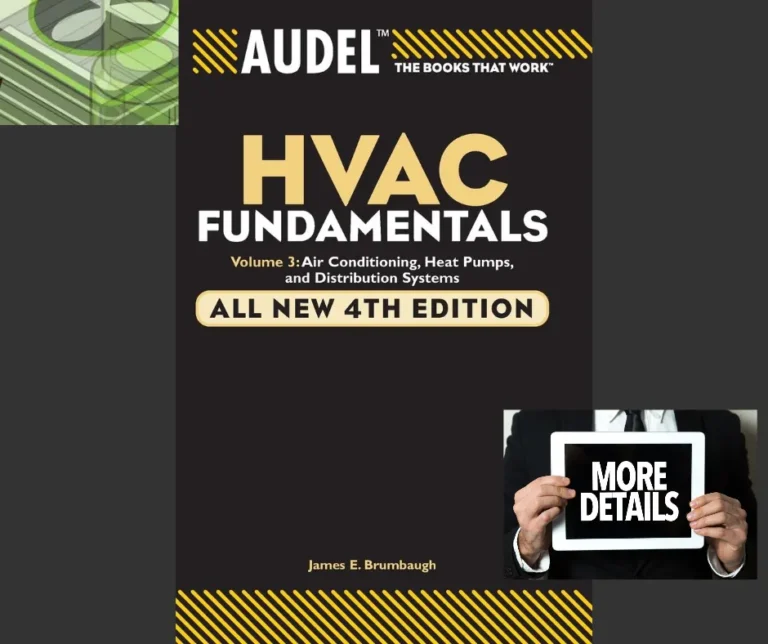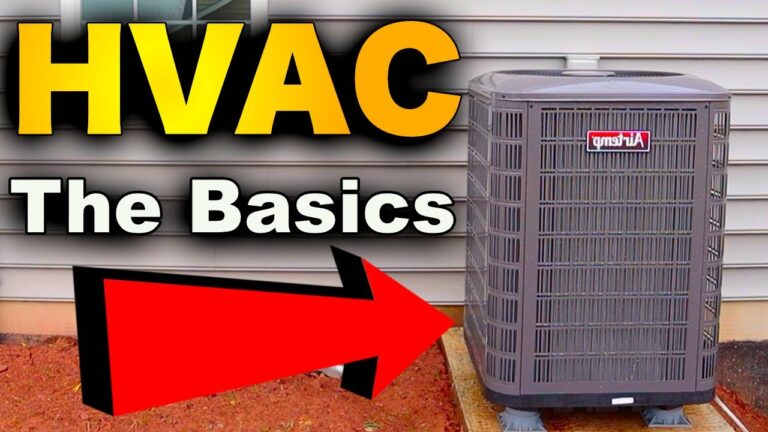HVAC Tips for Homeowners to Save Money
Welcome to “The Refrigeration & Air Conditioning Bible,” your essential guide to mastering the intricacies of HVAC systems.
In today’s world, climate control is not just a luxury; it is a necessity that affects your comfort, health, and energy efficiency.
Whether you are a seasoned professional looking to refine your skills or a newcomer eager to learn the fundamentals, this comprehensive resource is tailored to meet your needs.
You will explore the core principles of refrigeration and air conditioning, gaining insights into system design, installation, maintenance, and troubleshooting.
Delving into the latest technologies, industry standards, and best practices, you will be equipped with the knowledge to make informed decisions in both residential and commercial settings.
This guide emphasizes practical applications of HVAC Tips for Homeowners to Save Money, ensuring that you understand not only the “how” but also the “why” behind each concept.
With a focus on sustainability and energy efficiency, you will learn to navigate the evolving landscape of HVAC technologies.
As you progress through the chapters, you’ll gain the confidence to tackle complex projects and enhance your professional expertise.
Prepare to embark on a journey that will elevate your understanding and proficiency in the vital field of refrigeration and air conditioning.
Table of Contents HVAC Tips for Homeowners to Save Money
Master your HVAC controls for efficiency
Understanding and mastering the control of HVAC systems is essential for maximizing efficiency and ensuring optimal performance.
By familiarizing yourself with the various settings and features of your HVAC system, you can easily adjust temperature preferences, fan speeds, and scheduling to meet your specific needs.
This proactive approach not only enhances comfort but also saves money on repairs by preventing undue strain on the system due to improper settings or neglect.
Routine maintenance is key to long-term savings, and engaging in simple tasks like changing filters or cleaning vents can significantly extend the life of your equipment.
Implementing valuable tips for reducing costs, such as using programmable thermostats or setting your system to energy-saving modes, can further lower energy consumption.
In addition, having a basic grasp of troubleshooting tips enables you to identify minor issues before they escalate into costly repairs, ensuring your HVAC system runs smoothly and efficiently year-round.
Save money on repairs with prevention
Proactive maintenance is an effective strategy for mitigating repair costs and extending the lifespan of your HVAC system.
By regularly inspecting and servicing your equipment, you can detect early signs of wear and tear, addressing them before they lead to more serious problems.
This not only helps you avoid significant repair expenses but also enhances the overall efficiency of your system, ultimately resulting in lower energy bills.
Incorporating preventive measures into your routine, such as scheduling seasonal check-ups or keeping an eye on the system’s operational performance, is crucial.
Additionally, ensuring that your HVAC system is properly calibrated and free of obstructions can prevent overheating and unnecessary breakdowns.
By prioritizing these preventive practices, you empower yourself to maintain control over costs and safeguard your investment in quality HVAC performance.
Regular maintenance extends your system’s life
Consistent maintenance is key to mastering the control of your HVAC systems and ensuring they operate at peak performance.
Regularly scheduled inspections and tune-ups not only enhance energy efficiency but also play a significant role in prolonging the life of your equipment.
By dedicating time to routine upkeep, you can identify and resolve minor issues before they escalate into major repairs, ultimately saving you money in the long run.
Implementing valuable tips for reducing costs, such as cleaning filters, checking refrigerant levels, and monitoring system settings, contributes to the longevity of your units.
Moreover, familiarizing yourself with troubleshooting tips can help you recognize potential problems early on, allowing you to take proactive steps to mitigate them.
This comprehensive approach to maintenance not only protects your investment but also fosters a more reliable and efficient HVAC system that meets your comfort needs year after year.
Invest in long-term maintenance strategies today
Effectively managing long-term maintenance strategies is essential for preserving the efficiency and reliability of your HVAC systems.
By committing to a structured maintenance plan, you ensure that your equipment operates optimally while minimizing the likelihood of unexpected breakdowns.
This proactive approach allows you to anticipate potential issues and implement solutions before they become costly repairs, thereby protecting your investment and enhancing your overall comfort.
In addition to reducing repair costs, a well-executed maintenance strategy can lead to significant energy savings.
Regular system checks and timely adjustments keep your HVAC units running efficiently, which translates into lower utility bills over time.
By prioritizing long-term maintenance, you not only safeguard your equipment but also create a more sustainable environment.
Emphasizing these practices will ultimately result in a well-functioning system that delivers reliable performance for years to come.
Follow valuable tips to reduce costs
To effectively manage your HVAC systems, mastering the control of settings and schedules can lead to substantial cost reductions.
Implementing programmable thermostats allows you to optimize heating and cooling based on your daily routines, ensuring that energy is not wasted when spaces are unoccupied.
Additionally, regularly checking and adjusting your HVAC settings can prevent unnecessary strain on the system, further enhancing its efficiency.
Emphasizing preventative measures can also save you money on repairs over time.
Ensure that air filters are replaced regularly and that the system is free from debris to maintain airflow efficiency.
Engaging in simple troubleshooting tips, such as monitoring for unusual noises or temperature inconsistencies, can help you identify issues early and avoid more extensive repairs.
By committing to these valuable tips for reducing costs, you not only enhance the longevity of your HVAC system but also create a more cost-effective and comfortable environment.
Learn essential troubleshooting tips for HVAC
Understanding essential troubleshooting tips for HVAC systems is crucial for maintaining optimal performance and reducing long-term expenses.
Familiarize yourself with common indicators of system distress, such as fluctuating temperatures or unexpected noises.
By being vigilant and addressing these signs promptly, you can often resolve issues before they escalate into costly repairs.
Additionally, regularly checking your thermostat calibration and ensuring it is functioning correctly can prevent energy waste and provide a more comfortable living environment.
Incorporating a routine maintenance schedule allows you to take a proactive approach to your HVAC system’s health.
Simple steps, such as inspecting ductwork for leaks or ensuring proper airflow, can significantly impact your system’s efficiency.
By prioritizing these troubleshooting practices, you empower yourself to manage HVAC challenges effectively and sustain a budget-friendly operation, ultimately saving money on repairs and improving your overall home comfort.
Understand your system’s unique requirements
Every HVAC system operates under unique conditions influenced by factors such as the size of the space, insulation quality, and specific climate challenges.
By mastering the control of your HVAC systems, you can tailor performance to meet these distinct requirements, ensuring that your system runs efficiently and effectively.
Assess the layout and usage patterns of your space to make informed decisions about zoning or adjusting settings, which can enhance comfort while potentially lowering energy consumption.
Investing time in understanding these individual needs not only saves you money on repairs but also minimizes maintenance costs in the long run.
By implementing valuable tips for reducing costs, such as optimizing system settings and scheduling regular check-ups, you can avoid unnecessary wear and tear.
Awareness of your system’s requirements empowers you to react swiftly to any changes, allowing you to troubleshoot effectively and maintain peak performance.
Schedule routine check-ups for optimal performance
Regularly assessing your HVAC system through routine check-ups is essential for maintaining optimal performance and longevity.
By prioritizing these inspections, you can catch potential issues before they escalate into costly repairs.
This proactive approach not only enhances the reliability of your system but also contributes to energy efficiency, further driving down operational costs.
During these scheduled evaluations, technicians can identify wear and tear, clean vital components, and ensure that all parts are functioning as intended, thus safeguarding your investment.
Incorporating routine check-ups into your maintenance strategy will pay dividends in the long run, allowing you to allocate resources more effectively and avoid unexpected expenses.
Moreover, these assessments provide an opportunity to gain valuable insights into your system’s performance and efficiency.
By staying ahead of any emerging problems and implementing troubleshooting tips recommended by professionals, you can ensure that your HVAC system continues to operate at its best, providing you with comfort while maximizing cost savings.
Track energy consumption to identify issues
Monitoring energy consumption is a critical strategy for identifying potential issues within your HVAC system.
By systematically analyzing your energy use patterns, you can pinpoint anomalies that may indicate underlying problems, such as inefficient operation or necessary repairs.
This proactive approach allows you to master the control of HVAC systems, ensuring optimal performance while minimizing energy waste.
Regular energy assessments enable you to make informed decisions based on data, which can lead to substantial savings on your operating costs.
In addition to highlighting inefficiencies, tracking energy consumption facilitates long-term maintenance planning.
Understanding your system’s energy usage can help you establish a baseline for performance, making it easier to detect deviations that could point to mechanical or operational issues.
By staying vigilant and utilizing valuable tips for reducing costs, you can not only save money on repairs but also extend the lifespan of your HVAC system.
Ultimately, this practice empowers you to maintain a comfortable environment while preserving your financial resources.
Prioritize professional inspections to ensure reliability
Conducting professional inspections of your HVAC system is essential for ensuring its reliability and longevity.
These inspections provide a thorough examination of all components, enabling you to catch potential issues before they escalate into costly repairs.
By investing in routine assessments, you not only enhance the efficiency of your system but also master the control of HVAC systems, optimizing their performance.
Trained professionals can identify subtle signs of wear and tear, allowing for timely interventions that preserve your unit’s functionality.
Moreover, prioritizing these inspections contributes significantly to long-term maintenance strategies.
Regular check-ups can help you create a maintenance schedule tailored to your system’s needs, ultimately saving you money on repairs.
With the right troubleshooting tips and expert insights, you can proactively address problems, ensuring that your HVAC system operates at peak efficiency while minimizing unexpected breakdowns.
By committing to professional evaluations, you’re taking a crucial step towards maximizing the lifespan of your equipment and securing a comfortable environment.
In conclusion, “The Refrigeration & Air Conditioning Bible” serves as an invaluable resource for both seasoned professionals and newcomers in the field.
By equipping you with essential knowledge, practical insights, and advanced techniques, this comprehensive guide empowers you to navigate the complexities of refrigeration and air conditioning systems with confidence.
Whether you are looking to deepen your understanding, enhance your skills, or stay updated with industry trends, this book is a worthy addition to your library.
Embrace the wealth of information it offers, and let it be your go-to reference as you continue to excel in your career in HVAC.







